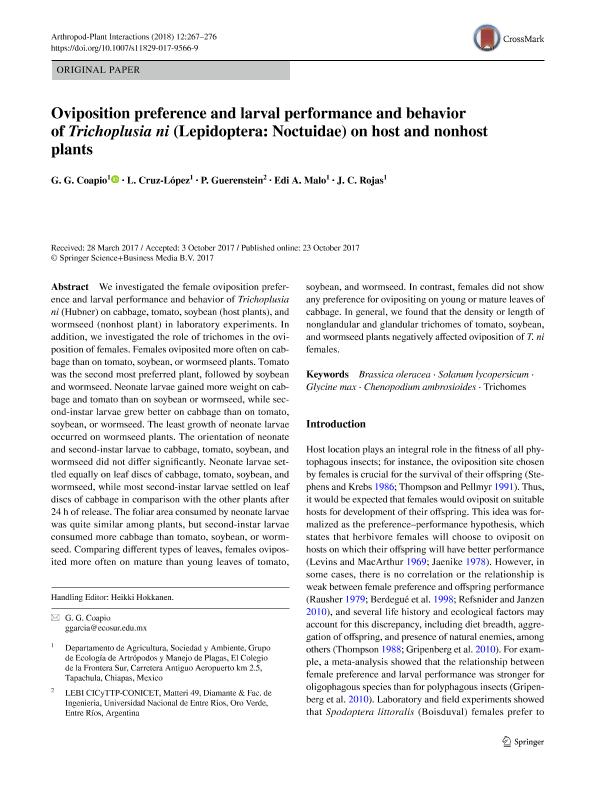Artículo
Oviposition preference and larval performance and behavior of Trichoplusia ni (Lepidoptera: Noctuidae) on host and nonhost plants
Fecha de publicación:
04/2018
Editorial:
Springer
Revista:
Arthropod-plant Interactions
ISSN:
1872-8855
Idioma:
Inglés
Tipo de recurso:
Artículo publicado
Clasificación temática:
Resumen
We investigated the female oviposition preference and larval performance and behavior of Trichoplusia ni (Hubner) on cabbage, tomato, soybean (host plants), and wormseed (nonhost plant) in laboratory experiments. In addition, we investigated the role of trichomes in the oviposition of females. Females oviposited more often on cabbage than on tomato, soybean, or wormseed plants. Tomato was the second most preferred plant, followed by soybean and wormseed. Neonate larvae gained more weight on cabbage and tomato than on soybean or wormseed, while second-instar larvae grew better on cabbage than on tomato, soybean, or wormseed. The least growth of neonate larvae occurred on wormseed plants. The orientation of neonate and second-instar larvae to cabbage, tomato, soybean, and wormseed did not differ significantly. Neonate larvae settled equally on leaf discs of cabbage, tomato, soybean, and wormseed, while most second-instar larvae settled on leaf discs of cabbage in comparison with the other plants after 24 h of release. The foliar area consumed by neonate larvae was quite similar among plants, but second-instar larvae consumed more cabbage than tomato, soybean, or wormseed. Comparing different types of leaves, females oviposited more often on mature than young leaves of tomato, soybean, and wormseed. In contrast, females did not show any preference for ovipositing on young or mature leaves of cabbage. In general, we found that the density or length of nonglandular and glandular trichomes of tomato, soybean, and wormseed plants negatively affected oviposition of T. ni females.
Archivos asociados
Licencia
Identificadores
Colecciones
Articulos(CICYTTP)
Articulos de CENTRO DE INV.CIENT.Y TRANSFERENCIA TEC A LA PROD
Articulos de CENTRO DE INV.CIENT.Y TRANSFERENCIA TEC A LA PROD
Citación
Coapio, G. G.; Cruz López, L.; Guerenstein, Pablo Gustavo; Malo, Edi A.; Rojas, J. C.; Oviposition preference and larval performance and behavior of Trichoplusia ni (Lepidoptera: Noctuidae) on host and nonhost plants; Springer; Arthropod-plant Interactions; 12; 2; 4-2018; 267-276
Compartir
Altmétricas




